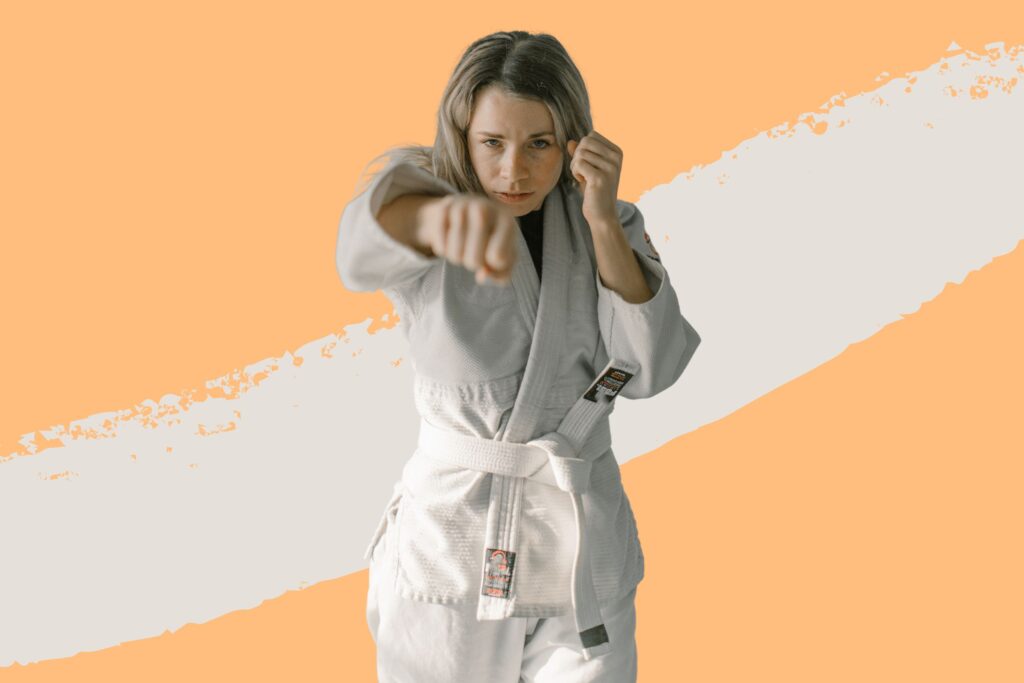Recent violent crime statistics in the UK reveal a concerning trend, having tripled since the start of the new millennium to reach record highs of 2.1 million crimes against the person in 2021/2022. Shockingly, the highest annual figure for sexual offences was also recorded in this period.
In light of these alarming figures, learning self-defence is more important than ever. Self-defence classes not only teach individuals how to protect themselves and others but also improve situational awareness, self-confidence, and mental health.
By equipping people with the skills to respond effectively to aggressive or dangerous situations, self-defence training can play a crucial role in enhancing personal safety and fostering a sense of empowerment in an increasingly uncertain world.
But First, Something Of A Side Note
Learning self-defence techniques can undoubtedly provide individuals with a sense of security and empowerment. However, relying solely on these methods to stay safe is not enough, especially when considering the connotations and broader societal context of placing the onus on the victim to reduce crime.
That said, while that oft repeated mantra “don’t teach women how not to get raped, teach men not to rape” is all very well and good, as one Guardian columnist once eloquently put when it comes to self defence;
“I am not about to sit around waiting for a mammoth cultural shift before I feel safer on the streets. Until society changes, what’s wrong with any woman equipping herself with some of the skills that could (and the word “could” is crucial here – there are no certainties) give her a fighting chance? Self-defence is not my responsibility; it is my choice, just as it is every woman’s choice”.
So, in the name of a sense of empowerment and building of both strength and resilience, here are 7 self defence tips that could save your life.

Be Aware Of Your Surroundings
One of the most critical aspects of self-defence is being aware of your surroundings. Always pay attention to what is happening around you, and avoid distractions such as using your phone or wearing headphones while walking alone. Keep an eye out for potential threats and be ready to react if necessary. Trust your instincts; if something feels off, remove yourself from the situation immediately.
Maintain Strong Body Language
Displaying confidence through body language can deter potential attackers. Walk with purpose, keep your head up, and maintain eye contact with those around you. This sends a message that you are not an easy target and may cause potential assailants to think twice before approaching you. Additionally, practising self-defence techniques can help build confidence in your ability to protect yourself, further enhancing your assertive body language.
Learn Basic Physical Self-Defence Techniques
Investing time in learning basic self-defence techniques can be life-saving. Several martial arts disciplines focus on self-defence, such as Krav Maga, Brazilian Jiu-Jitsu, and Muay Thai. These classes teach practical skills that can be used in real-life situations.
Even if you cannot commit to regular classes, consider attending a self-defence workshop or watching instructional videos online. Some key physical defence techniques to learn include escaping from various holds, striking vulnerable areas on an attacker’s body, and using everyday objects as improvised weapons.

Use Your Voice
Your voice can be a powerful self-defence tool. If you feel threatened, do not hesitate to yell or scream to draw attention to the situation. This can startle an attacker and alert others nearby, who may intervene or call for help. Practice projecting your voice loudly and confidently, and consider using phrases like “back off” or “leave me alone” to communicate boundaries and possibly even your intent to defend yourself.
Read: 5 ways to improve your communication with others
Consider Carrying Personal Safety Devices
In the United Kingdom, the laws surrounding personal safety devices for self-defence are quite strict. It is illegal for any member of the public to carry a lethal or non-lethal self-defence weapon, and doing so can result in imprisonment. However, there are a few legal alternatives available for individuals seeking to protect themselves.
One of the most common legal self-defence products in the UK is a personal security alarm, also known as a rape alarm. These devices are inexpensive and can be purchased from local police stations, supermarkets, and other retailers. They emit a loud noise when activated, drawing attention to the user and potentially deterring an attacker.
Also, whilst carrying pepper spray is illegal in the UK (and carries the same legal penalties as carrying a firearm does), there are legal alternatives available, such as the Safehaus Criminal Identifier. This product temporarily marks an attacker with a brightly coloured dye, making it easier for law enforcement to identify them later.
It should be said that the use of such personal safety devices may risk exacerbating a situation.
Develop An Escape Plan
In any dangerous situation, your primary goal should be to remove yourself from harm’s way as quickly as possible. Identify potential escape routes and safe locations in your daily environment, such as well-lit areas with people present.
If you find yourself in a threatening situation, try to put distance between yourself and the attacker, using obstacles like parked cars or furniture to slow them down. Remember that your safety is more important than your belongings; if an attacker demands your wallet or phone, it’s safer to comply and then seek help once they have left.
Trust Your Instincts
Your instincts are a powerful tool in assessing and responding to danger. If something feels off or you sense that someone may pose a threat, trust your gut and take action to protect yourself. This may involve crossing the street, entering a store or public building, or contacting a friend or family member for assistance. It is always better to err on the side of caution and prioritise your safety.
Read: 6 items to invest in to increase the safety of your loved ones
The Bottom Line
While it is impossible to predict every potential threat, being prepared and knowledgeable about self-defence can significantly increase your chances of staying safe. By practising these seven tips, you can take control of your personal safety and feel more confident in your ability to protect yourself and your loved ones.
Remember that awareness, assertiveness, and preparedness are key factors in effective self-defence, and by cultivating these skills, you can reduce your vulnerability and navigate the world with greater peace of mind.
It should be noted, of course, that these techniques are certainly not catch-all and applicable as best practice in every situation.





